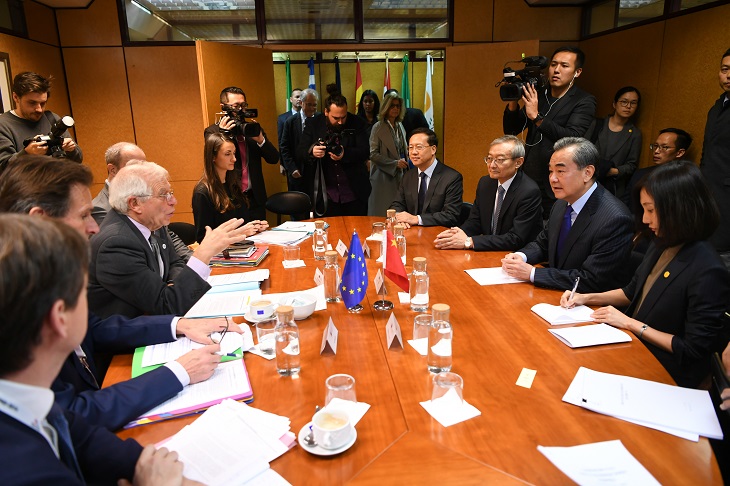In lockstep Europe, Asia strike strong note on upholding multilateralism
Published : 17 Dec 2019, 09:56
Dozens of Asian and European countries, in a concerted manner, have sent out a new, strong message on upholding multilateralism amid mounting global challenges.
A nine-page Chair's Statement, released at the end of the 14th Foreign Ministers' Meeting of the Asia-Europe Meeting (ASEM) here on Monday, stressed "the need to address pressing common global challenges, on the basis of a strong commitment to multilateralism.
COMMON APPROACH AGAINST UNILATERALISM "At a time when the international order based on the rule of law and international law is being challenged, ASEM partners reiterated their resolve to uphold and strengthen cooperative, multilateral and plurilateral approaches," read the statement.
"The Chair's Ministers underlined the value of ASEM as a building block for strong and effective multilateralism and the rules-based international order, anchored in international law with the UN at its core," the statement continued.
From the lines, it is not a tall order to find a growing chorus of disapproval at unilateralism that is currently on the rampage, with the latest case concerning the World Trade Organization (WTO) Appellate Body.
The body, considered the supreme court of the WTO, is supposed to have seven judges, and at least three members are needed to hear an appeal.
Since the terms of two of the three remaining judges expired on Dec. 10, and the United States has blocked the nomination of new judges, the Appellate Body will be unable to hear new disputes.
ASEM foreign ministers "underlined the urgency to overcome the impasse in the appointment of members to the Appellate Body, to initiate its selection process promptly, as well as to ensure the proper functioning of the dispute settlement system," read the statement.
The United States' blockade on the body is the latest of a series of unilateral moves in recent years that have jolted multilateral institutions.
Enrique Fanjul, an economist at the Madrid-based CEU San Pablo University, described the "assault on multilateralism" as an unusual phenomenon.
"There is thus a paradox that one of the significant engines for economic growth and well-being in recent decades has been under attack," he said.
ASEM'S WEIGHT Established in 1996, the ASEM is a forum for dialogue and cooperation between the two continents. It brings together 53 partners, including 30 European and 21 Asian countries, the European Union, and the Association of Southeast Asian Nations Secretariat.
According to data from ASEM info board, ASEM partners account for 55 percent of global trade, more than 60 percent of the world's population, 65 percent of the global economy and 75 percent of global tourism.
Josep Borrell, EU high representative for foreign affairs and security, cited the figures in his opening speech at the meeting, saying, "ASEM matters for the sheer weight it represents."
"We need to use this collective weight and power and put it at the service of promoting rules-based solutions to key challenges we face," he said.
Echoing Borrell, Spanish King Felipe VI said "due to its open, informal and ever-evolving nature, ASEM is an ideal framework to discuss and advance new ideas or proposals at a crucial moment in history."
Enrique Ayala, an analyst at the Spanish think tank Fundacion Alternativas (Foundation Alternatives), underscored that the world needs rules, dialogues and cooperation among all the global actors.
ASEM meetings "are very important to indicate the path and the priorities in the construction of new consensuses and new rules governing the evolution of the planet," Ayala told Xinhua.
UNTAPPED POTENTIAL Economic partnership is one of ASEM's "three pillars." Although recent years have witnessed burgeoning trade relations between the two continents, experts said there is still enormous untapped potential.
Take trade relations between China and Germany -- Asia and Europe's respective powerhouse -- as an example, China ranks third with a 7-percent share in Germany's export in 2018, according to data from TradingEconomics.com.
The data also showed that China ranks 10th on Spain's export partner list, accounting for 2.3 percent of Spain's exports in 2018.
"The terrain to be covered is still vast," Juan Tugores, a professor of economics at the University of Barcelona, told Xinhua.
Tugores added that it is essential to deepen relations between the two continents amid the twist and turns of trade frictions between China and the United States.
"Europe also holds a place in the battle and could shift the balance on both the 5G technology and climate change agenda," he said.
Echoing Tugores, Ayala said that "this region exists as a union to serve as a balance factor between other world powers." Enditem
(Xinhua correspondents Feng Junwei, Adela Mac Swiney Gonzalez and May Ponzo from Madrid also contributed to the story.)


